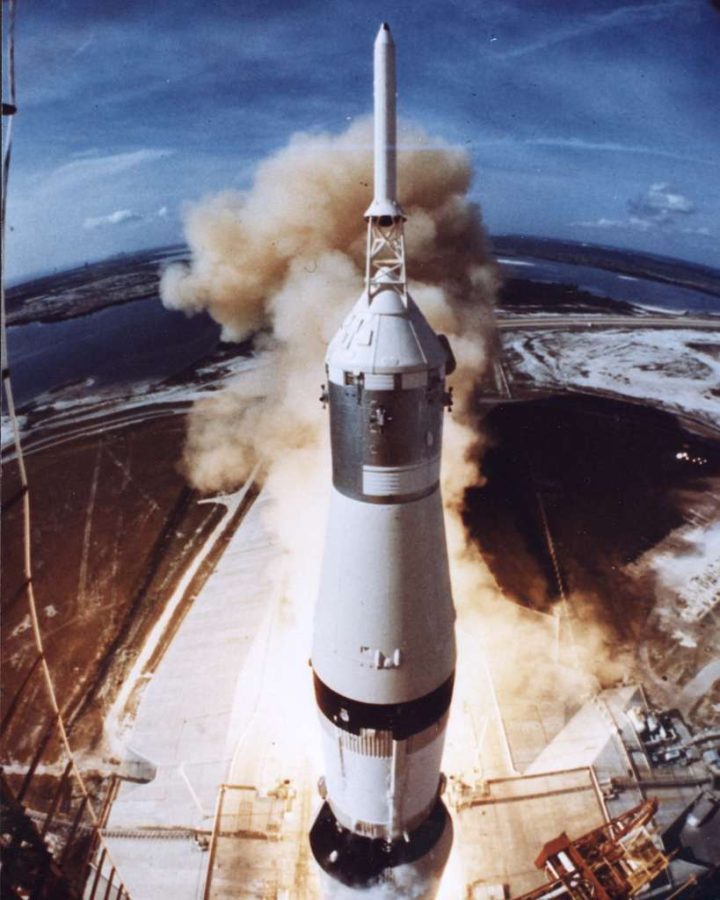Should NASA’s Budget Be Increased?
During the height of NASA’s success, the Saturn V lifts off.
May 12, 2022
Increasing NASA’s budget will open up tremendous opportunities for advancing not just spaceflight, but also society.
For example, according to nasa.gov, a recent study has shown that in 2019, NASA generated over $64.3 billion and supported over 300,000 jobs while the agency’s budget stood at $21.5 billion.
Since the Apollo program NASA has seen its federal funding take a sharp decrease and the things that the agency has been able to do have been limited. Currently NASA’s annual budget for this year stands at $24.04 billion which is just 0.48% percent of government spending.
The Apollo Program, the pinnacle of human spaceflight, was the time NASA spent the most money. According to theguardian.com, NASA spent $4.251 billion in 1969. When considering inflation, that equates to nearly $33 billion.
NASA does not need to spend that much money because their technology has vastly improved since then and it has become cheaper to build spacecraft and rockets. However, NASA’s budget should still be increased.
One can only imagine what NASA could do with even just a slight increase of the budget.
Many people may ask why NASA’s budget has been dropped by about 4% of government spending. Since the space race, enthusiasm for spaceflight has been extremely low and many people who do not realize the economic benefits of spaceflight want to focus on fixing issues on Earth. Although it seems there are no benefits to spaceflight, there are both economic ones and practical ones.
For example, many critical inventions have come from space travel. According to https://www.jpl.nasa.gov/, some of these inventions include insulin pumps, cochlear implants, water filters, portable computers, freeze-dried foods, invisalign, better performing solar-cells, ear thermometers, precision GPS, home insulation, wireless headphones, CAT scans, and much more. Increasing NASA’s budget would likely increase the output of these useful and sometimes even life-saving inventions.
Also, an increase in NASA’s budget would allow for more contracts to be given out to other aeronautics companies like SpaceX, ULA, Blue Origin, Boeing, Lockheed Martin, Northrop Grumman, and more. These companies can build more technologically capable probes, rockets, satellites, and other spacecraft hardware.
Because of budgetary constraints, some NASA missions have been canceled. For instance, Apollo 18, 19, and 20 were all canceled due to budgetary concerns. Also, the HLS contract (Human Landing System), which is given out to a company to build a lunar lander for the Artemis Mission, was only able to be given out to one company, SpaceX, instead of multiple like originally planned.
There are both economic and social advantages to increasing NASA’s budget, so just a small increase would make a huge difference.













Mac • Apr 24, 2025 at 1:09 pm
Noice
Mac • Apr 10, 2025 at 12:27 pm
Yay
Molly • May 13, 2022 at 10:46 pm
Will, this is an extremely informative article! I especially enjoyed learning that many life changing inventions have developed out of space travel. What better reason to support future space travel?
Norris Myers • May 13, 2022 at 7:20 pm
Will, you have convinced me more funding for these projects is a worthy cause. It is very exciting to think about the future and what might occur with budget increases for NASA. You may even be involved in some of the future projects, yourself! I hope so!!!